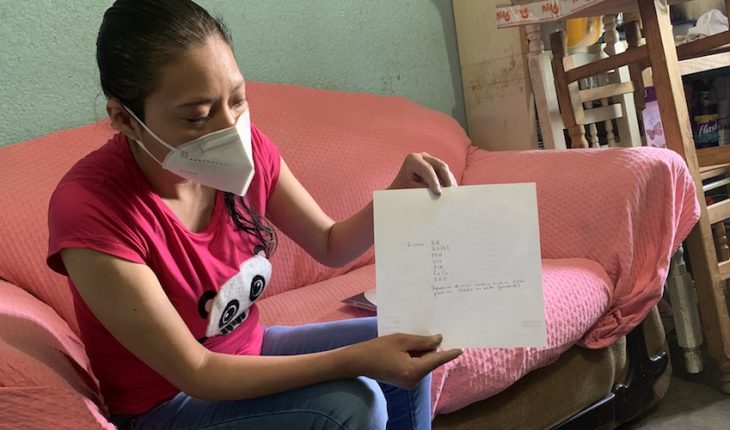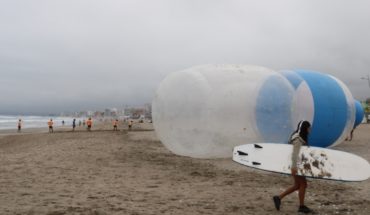Leticia Méndez Martínez suffers from Lupus Erythematosus, a disease in which the immune system attacks the body’s own organs. Due to lung problems, she was hospitalized, from January to April 2020, at the National Institute of Respiratory Diseases (INER). There they gave her the diagnosis of her disease, but since she was discharged and the hospital became 100% COVID, they only received her for two more consultations, then they have not wanted to attend her or referred her to any other public institution.
“I felt like I was thrown into the street, helpless and I can also die if they do not give me medical attention and medicines, this is not a flu, it is a disease that if not controlled advances faster and damages my organs,” says Leticia.
On March 13, 2020, just started the health continence in Mexico, the INER began the reconversion of areas and the displacement of its regular patients, until the discharge of the last one at the beginning of May.
This hospital was, in fact, the first public institution to receive a patient affected by the coronavirus and became an emblem of the fight against the disease. Even while other hospitals have already reactivated regular care for other conditions, it continues to serve only people with infection caused by the SARS-CoV2 virus, which has impacted those receiving other types of treatments.
Read more | In AMLO’s government, public health care decreases by 40% and private health care increases
According to the Annual Self-Assessment Report of the general director of INER, Jorge Salas Hernández, which covers from the first of January to December 31, 2020 and which was presented in April 2021, as a result of the reconversion to COVID of this hospital, the total of the consultations granted, in that period, between pre-consultations, First-time and subsequent consultations fell 64.5%, going from 71,657 in 2019 to 25,418 in 2020.
First-time asthma visits, for example, were reduced by a quarter, from 811 in 2019 to 209 in 2020 and those for interstitial diseases (in which scarring occurs in the lungs from different causes, including autoimmune conditions such as lupus) decreased almost fivefold, going from 484 to 95.
While the subsequent ones of all the ailments went from 57 thousand 481 in 2019 to 13 thousand 969 in 2020, a decrease of 75.5%.
“Derived from the reconversion of the Institute as a 100% COVID hospital, in the month of March the face-to-face care of other patients in the outpatient service was canceled, however, everyone was informed (pre-consultation, first time and subsequent) that in case of exacerbation of their respiratory condition they would go to a non-COVID-19 hospital”, says the director’s report.
In Leticia’s case, it was not suggested that she go to any other public hospital, nor was there an attempt to refer her. Political Animal requested an interview with the director of the INER just to know how much the attention in consultations and hospitalizations for other conditions other than COVID has fallen to this date in the Institute and why there was no reference system to other public institutions, but although the interview had already been agreed for this Saturday, at the last minute it was cancelled and there was no longer a response.
Leticia, 29, says that the rheumatologist who gave her the last consultation and who warned her, by phone, that they could no longer attend her at the INER, what she suggested was that she seek private attention.
The woman, who was employed as a domestic worker but has had to stop working because of the contingency and her illness, says that the same rheumatologist began to receive her, but in her private office. “At first he didn’t charge me, but then he started charging me 500 pesos, an amount that for me and my husband, who works selling coffee and bread in a cart, is very high.”
The patient also had to bear the cost of her medications. That was another impact of the pandemic for her and her family. “I take metrotexate and hydroxychloroquine, among other drugs, but those two became scarce and went up a lot in price.”
Methotexate is scarce in the country because of a drop in the production of raw material internationally, but also because the health authorities closed production lines of the main manufacturer of this drug in Mexico, because of alleged irregularities in these.
Leticia Méndez Martínez, a lupus patient who for a year and a half has not received care in any public health institution and must pay for consultations and medications to control her disease.
While hydroxychloroquine rose in price and became scarce because in social networks and news began to be advertised as an effective drug in the treatment against COVID-19.
“The metrotexato I got before in 150 pesos and now I get it in a thousand pesos, because it is very scarce, my mother had to lend me her savings to buy it. Hydroxychloroquine is so scarce that it has to be ordered through an application and the minimum order is two boxes to be sent, each one costs 850 pesos, “says Leticia.
Due to her economic situation, but above all because no public institution provides her with care or medicines, Leticia has had to interrupt her treatment several times during these months.
“With the pandemic, my husband had to stop working for a few weeks, we didn’t have the money to buy the medicines, so I stopped my treatment, and my kidney was also already affected.” The nephrologist, with whom the rheumatologist recommended her, charges her one thousand 800 the consultation and as an additional asked her to have a biopsy, with an acquaintance, with a cost of 22 thousand pesos. Leticia’s family gathered their savings so that they could do it and confirm the kidney damage.
“Those who have been supporting my husband and me with expenses are my family, my brothers, my mom, but all their savings have already been spent, they have already told me that they will no longer be able to help and I cannot be without medical attention and without medicines because the disease is going to advance,” Leticia says through tears.
Still this Monday, October 11, the woman went to the INER to request that they reactivate their care, the answer was the same, that they can not receive it because they are a hospital dedicated to attending COVID patients.
Advised by a civil society organization, Leticia also went to the National Institute of Cardiology, where she was told that they would try to treat her or channel her to the General Hospital of Mexico or Nutrition, but not without the reference sheet of the same neuromatologist who never told her that she could look for another public institution.
Leticia is waiting for the doctor to answer her messages to go through her reference sheet and see if, after almost a year and a half, they return to attend her and guarantee her right to health.
What we do at Animal Político requires professional journalists, teamwork, dialogue with readers and something very important: independence. You can help us keep going. Be part of the team.
Subscribe to Animal Político, receive benefits and support free journalism.#YoSoyAnimal





